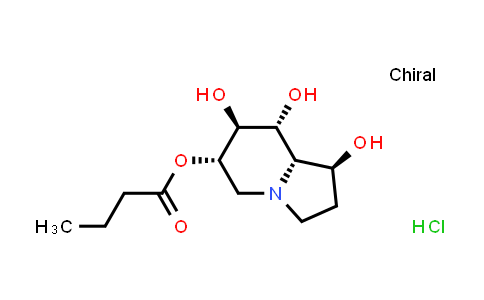
Celgosivir (hydrochloride) NLT 98%
SKU : MC522088
CAS Number : 141117-12-6
Molecular Formula : C12H22ClNO5 | Molecular Weight : 295.76
Synonyms : MBI 3253 (hydrochloride); MDL 28574 (hydrochloride); MX3253 (hydrochloride)
Quote Request| Purity | NLT 98% |
|---|---|
| Storage | at 20ºC 2 years |
* The above information is for reference only.
* If the product has intellectual property rights, a license granted is must or contact us.
| Chemical Name | Celgosivir (hydrochloride) |
|---|---|
| CAS Number | 141117-12-6 |
| MDL Number | MFCD18839225 |
| Molecular Formula | C12H22ClNO5 |
| Molecular Weight | 295.76 |
| Synonyms | MBI 3253 (hydrochloride); MDL 28574 (hydrochloride); MX3253 (hydrochloride) |
Celgosivir hydrochloride (MBI 3253 hydrochloride; MDL 28574 hydrochloride; MX3253 hydrochloride) is an α-glucosidase I inhibitor; inhibits bovine viral diarrhoea virus (BVDV) with an IC50 of 1.27 μM in in vitro assay. IC50 & Target: IC50: 1.27 μM (α-glucosidase I)[1] In Vitro: Celgosivir is more effective (IC50=20 μM) than the parent molecule (IC50=254 μM) at causing the accumulation of glucosylated oligosaccharides in HIV-infected cells by inhibition of glycoprotein processing. Celgosivir exhibits potent antiviral activity against HIV-1 with an IC50 of 2.0±2.3 μM[1]. Bovine viral diarrhoea virus (BVDV) is a closely related virus of hepatitis C virus (HCV). Celgosivir inhibits BVDV with IC50 values of 16 and 47 μM in plaque assay and cytopathic effect assay, respectively[2]. Celgosivir inhibits DENV2 replication with an EC50 of 0.2 μM. The EC50 values against DENV1, 3 and 4 are less than 0.7 μM[3]. In Vivo: Celgosivir fully protects AG129 mice from lethal infection with a mouse adapted dengue virus at a dose of 50 mg/kg twice daily (BID) for 5 days and is effective even after 48 h delayed treatment. The protection by celgosivir is dose- and schedule-dependent and that a twice-a-day regimen of 50, 25 or 10 mg/kg is more protective than a single daily dose of 100 mg/kg. Pharmacokinetics studies of celgosivir in mice shows that it rapidly metabolizes to castanospermine[4]. During primary infection with a mouse-adapted DENV strain S221, mice shows increased viremia on day 3, yet 80% survived day 10 with virus completely cleared by day 8[3].
Related Products
© Copyright 2015-2024 Hangzhou MolCore BioPharmatech Co.,Ltd. All rights reserved.
